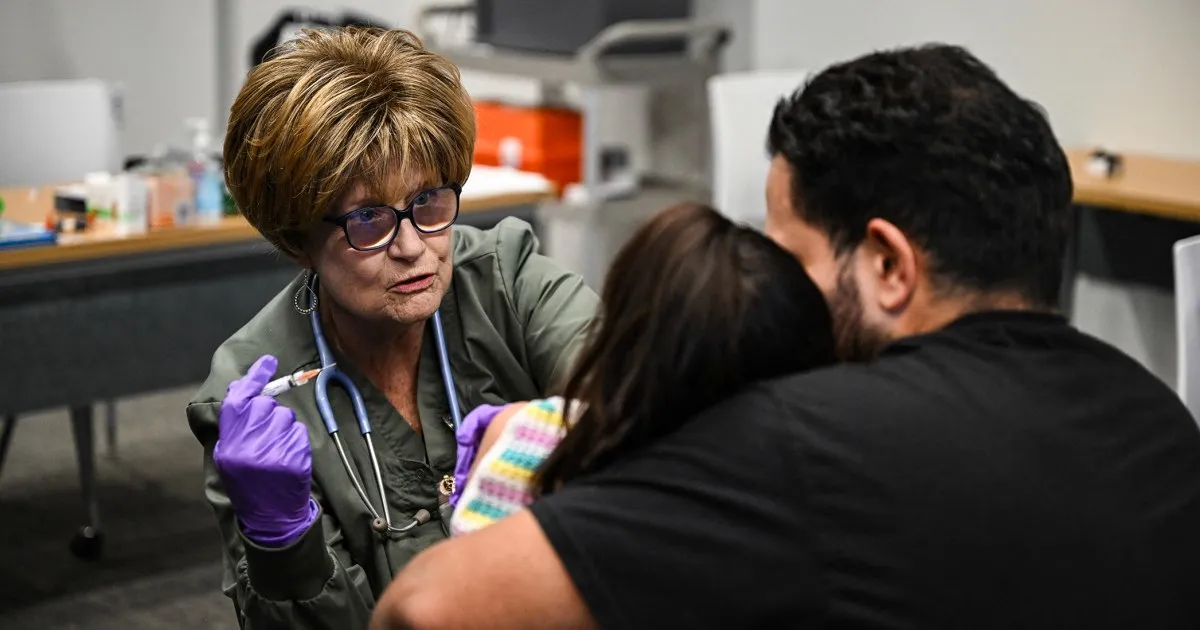
The United States is currently experiencing the highest number of measles cases since the disease was declared eliminated in 2000. According to NBC News, a total of 1,277 cases have been reported across the country since the beginning of the year, highlighting a significant public health challenge. Tragically, this year also marked the first measles-related deaths in a decade, with two unvaccinated children in Texas and an adult in New Mexico succumbing to the disease.
For the past 25 years, the U.S. has maintained its elimination status for measles, which means the virus has not been spreading continuously for a year. However, outbreaks still occur, including a notable one in a Mennonite community in West Texas earlier this year. Vaccination rates in Gaines County, the epicenter of this outbreak, are alarmingly low. As of the 2023-24 school year, only 82% of kindergarteners in the county have received the recommended two doses of the measles, mumps, and rubella (MMR) vaccine, far below the 95% threshold necessary to effectively curb the spread of the virus.
Dr. David Sugerman, a senior scientist at the Centers for Disease Control and Prevention (CDC), indicated at an April meeting that if measles continues to spread through January 20 of the following year, the U.S. could lose its elimination status. The majority of cases reported this year are linked to the Southwest outbreak, with over 700 cases occurring in Texas alone. Smaller outbreaks, often resulting from international travel, have also been documented nationwide.
The resurgence of measles can be attributed, in part, to declining vaccination rates both nationally and globally. During the 2023-24 school year, less than 93% of kindergartners received the recommended two doses of the MMR vaccine, a decrease from 95% during the 2019-20 school year. The situation in West Texas mirrors a similar outbreak in 2019 among Orthodox Jewish communities in New York, which also had low vaccination rates and resulted in 1,274 cases.
In response to the 2019 outbreak, New York implemented a vaccination campaign that included a vaccine mandate and the administration of 60,000 doses in affected communities, successfully curbing the spread of the virus. However, Dr. Sugerman expressed concerns regarding Texas's ability to emulate this success, noting that cuts to COVID-19 funding have created funding limitations for state health departments. The CDC recently reduced its funding by $11.4 billion, which had previously supported responses to disease outbreaks.
Each measles case can incur costs ranging from $30,000 to $50,000 to manage, which can quickly accumulate as outbreaks continue. Additionally, many experts are worried that federal messaging around vaccinations may complicate containment efforts. While Health and Human Services Secretary Robert F. Kennedy Jr. has advocated for measles vaccination, he has also framed it as a personal choice and promoted unproven treatments, contributing to public confusion.
Dr. Ana Montanez, a pediatrician treating patients in Lubbock and Gaines County, highlighted misinformation as the "biggest nemesis" for healthcare providers. She noted that some patients are opting for alternatives like vitamin A instead of getting vaccinated. Although Kennedy has emphasized the potential benefits of vitamin A for measles patients, the CDC clarifies that while vitamin A can be administered under medical supervision, it is not a treatment for the disease.
In stark contrast to the alternatives being promoted, two doses of the MMR vaccine are 97% effective against measles and provide lifelong protection. The virus poses significant risks, especially to babies and young children, whose immune systems may not be fully developed. In Texas, health officials recommend that babies aged 6 to 11 months receive an early dose of the MMR vaccine, while unvaccinated children over 12 months should get one dose, followed by a second dose 28 days later.
Measles typically begins with symptoms such as high fever, cough, runny nose, and watery eyes. As the illness progresses, individuals may develop white spots on the insides of their cheeks and a distinctive blotchy rash. Severe cases can lead to complications such as pneumonia or encephalitis, with the CDC estimating that 1 to 3 out of every 1,000 children infected with measles may die from respiratory and neurological complications.
Given the current situation, it is crucial for communities to prioritize vaccination and combat misinformation to prevent further outbreaks and protect public health.